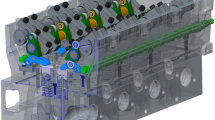Zusammenfassung
Further improvement of the trade-off between CO2- and pollutant emissions motivates the development of new diesel engine concepts. The deactivation of one or more cylinders of a light-duty diesel engine during low load operation can be a sophisticated method to improve fuel economy and reduce especially NOX emissions at the same time.
This publication presents the potential of extended cylinder deactivation (CDA) strategies by means of steady-state, 1D simulations in combination with transient powertrain simulations. The transient cycle investigations have been conducted using the Worldwide Harmonized Light Vehicle Test Procedure (WLTP) and Real Driving Emissions (RDE) cycles. A representative mid-size SUV, powered by a state-of-the-art 2.0 l, 4-cylinder diesel engine, was considered for these investigations. The engine is equipped with both high and low pressure EGR and a closed-coupled DOC/SCRF system with an additional underfloor SCR.
The potential of a selective CDA of separate cylinders by Dynamic Skip Fire (DSF®) technology, as part of an extended CDA strategy, has been analyzed in detail. The results show a CO2-benefit of approximately 2 % under a RDE cycle, while simultaneously reducing tailpipe NOX emissions by approximately 11 %. These improvements have been achieved by an increased engine efficiency due to a shift in the engine operation conditions by the extended CDA strategies. Implementing these CDA strategies also results in higher exhaust temperatures which further improves the conversion efficiency of the aftertreatment system. Furthermore, the investigations have been extended to show the potential of this strategy when applied to an 8.0 l medium duty diesel engine application.
Access this chapter
Tax calculation will be finalised at checkout
Purchases are for personal use only
Preview
Unable to display preview. Download preview PDF.
Similar content being viewed by others
Literatur
1. Adolph, D., Busch, H., Pischinger, S., Kolbeck, A., et al., “Advanced Diesel Combustion – A Method Demonstrating Favorable Untreated Engine Emissions with Improved Consumption Characteristics”, MTZworldwide 69, 2008, No. 01, pp. 24-31.
2. Körfer, T., Schnorbus, T., Miccio, M., Schaub, J., “Emission-based EGR Strategies in Diesel Engines for RDE Requirements”, MTZworldwide 75, 2014, No. 9, pp. 10-17.
3. Deppenkemper, K., Özyalcin, C., Ehrly, M., Schoenen, M. et al., “1D Engine Simulation Approach for Optimizing Engine and Exhaust Aftertreatment Thermal Management for Passenger Car Diesel Engines by Means of Variable Valve Train (VVT) Applications”, SAE Technical Paper 2018-01-0163, 2018, https://doi.org/10.4271/2018-01-0163.
4. Blanco-Rodriguez, D., Vagnoni, G., Holderbaum, B., “EU6 C - Segment Diesel vehicle s, a challenging segment to meet RDE and WLTP requirements”, 8th IFAC Symposium Advances in Automotive Control, Sweden, 2016.
5. Blanco-Rodriguez, D., Vagnoni, G., Aktas, S., Schaub, J., “Model-based Tool for the Efficient Calibration of Modern Diesel Powertrains”, MTZworldwide 77, 2016, No. 10, pp. 54-58.
6. Chen, K., Wang, R., Younkins, M. Scassa, M., et. al., “Dynamic Skip Fire Applied to a Diesel Engine For Improved Fuel Consumption and Emissions”, 4th International Conference Diesel Powertrain 3.0, 2018, Coventry.
Author information
Authors and Affiliations
Editor information
Editors and Affiliations
Rights and permissions
Copyright information
© 2019 Springer Fachmedien Wiesbaden GmbH, ein Teil von Springer Nature
About this paper
Cite this paper
Deppenkemper, K., Schönen, M., Lindemann, B., Scassa, M., Younkins, M., Wang, R. (2019). Extended cylinder deactivation strategies to improve CO2 and pollutant emissions for light-duty diesel engine applications. In: Bargende, M., Reuss, HC., Wagner, A., Wiedemann, J. (eds) 19. Internationales Stuttgarter Symposium . Proceedings. Springer Vieweg, Wiesbaden. https://doi.org/10.1007/978-3-658-25939-6_52
Download citation
DOI: https://doi.org/10.1007/978-3-658-25939-6_52
Published:
Publisher Name: Springer Vieweg, Wiesbaden
Print ISBN: 978-3-658-25938-9
Online ISBN: 978-3-658-25939-6
eBook Packages: Computer Science and Engineering (German Language)




